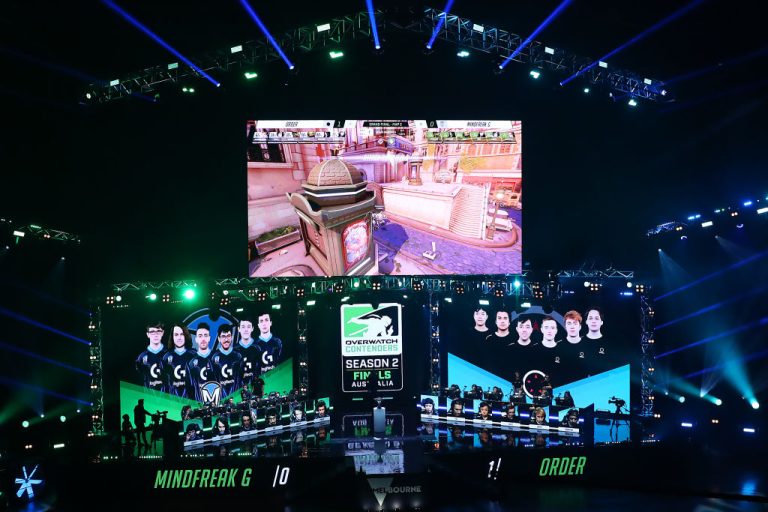Gaming industry giant Activision Blizzard is implementing certain surveillance mechanics in its arcade-style first person shooter Overwatch 2, which has some concerned oversight is becoming a little too analogous to that used by the Chinese Communist Party in its Great Firewall and social credit system campaigns.
In a Sept. 27 blog post, Blizzard’s public relations team attempted to hype the implementation of a set of measures proclaimed to combat abusive and cheating players dubbed Defense Matrix Activated! Fortifying Gameplay Integrity and Positivity in Overwatch 2.
The “Defense Matrix” described involves two major components. The first, coined “SMS Protect” simply means that “all players across all platforms, including consoles, are required to have a phone number attached to their battle.net account to launch Overwatch 2.”
MORE ON SOCIAL CREDIT
- Greece Moves Towards Social Credit as Digital ID App Replaces Drivers Licenses
- Sri Lanka Introduces Social Credit QR Code Fuel Rationing Amid Economic Collapse
- France Deploys AI Surveillance to Track Undeclared Swimming Pools, Takes €10 Million in Taxes
- Brits to be Paid ‘Bonuses’ in Subsidized Energy Rationing Scheme
Blizzard framed the measure in the context of “an industry-proven solution in combating both cheating and disruptive behavior” serving the role of “further protecting your Overwatch 2 experience from bad actors.”
SMS Protect is meant to attempt to limit one individual person to one account, the post explains, “The same phone number cannot be used on multiple accounts at the same time, and players can’t use the same phone number to create multiple accounts.”
Success
You are now signed up for our newsletter
Success
Check your email to complete sign up
“A phone number can only be used once when making a new account, and certain types of numbers, including pre-paid and VOIP, cannot be used for SMS Protect,” Blizzard clarified.
The second aspect of the scheme involves the company recording in-game voice chat and then, if you are reported by another player or report another player, the audio is fed through artificial intelligence and transcribed into text.
The text file is then “analyzed for disruptive behavior by our chat review tools.”
Blizzard claims that the file is “quickly deleted as the file’s sole purpose is to identify potentially disruptive behavior.”
For those outraged by the changes, Blizzard does have some grounds justifying its choices since Overwatch 2 is a free to play game, compared to the original, which retailed for $39.99.
Because the sequel is free, there is no financial disincentive to stop cheaters and trolls from simply creating a new account and continuing their old ways.
The measures are sensitive, as Activision Blizzard has hardly proven itself as a bastion of free speech.
In 2019, during the historic Heaven Will Eliminate the Chinese Communist Party protests in Hong Kong, which saw millions of citizens take to the streets to oppose legislation that would have seen the city’s democratically governed citizens extradited to mainland China to face the Party’s kangaroo court system, Blizzard muzzled one of its professional players for speaking out for his home city.
Ng Wai “blitzchung” Chung was banned by the company from the 2019 Hearthstone Grandmasters Official Competition after appearing on a Taiwanese livestream of the event wearing a mask.
As this was the days before Coronavirus Disease 2019 (COVID-19) existed, the symbolism of masking represented a way for protestors to obscure their identity from Hong Kong Police, a method which was subsequently outlawed by the local government.
Chung not only wore a mask on stream, but suddenly shouted live on air the viral protest slogan: “Liberate Hong Kong, revolution of our age!”
The livestream was immediately cut and replaced by advertising, Report the Net stated in coverage of the event at the time.
In addition to the ban from the tournament and the accompanying revocation of prize money, Chung was also barred for 12 months from participating in any professional Hearthstone event.
Blizzard’s “Defense Matrix” system does bear the same overtones as the CCP’s social credit system.
For example, a 2019 article by Trivium User Behavior, an entity that boasts it “explores the human factors driving China’s user markets,” the company explained several of many apps that comprise the Party’s social credit system while in the process of attempting to paint social credit in a positive light.
Chengxin Chunyun is described by Trivium as “an app released in 2017 by a consortium of national state agencies and credit companies” that focuses on the annual migration of hundreds of millions of citizens who return to their hometowns for the Spring Festival.
The social credit system is, itself, tied to mobile phones, which are required for virtually every aspect of daily living in China. Mobile phones cannot be obtained anonymously and must be linked to a person’s national ID.
The Chengxin app, which also has a corresponding WeChat plugin, was designed to accept “both positive and negative reports on transport service quality and passenger behavior.”
Just like in western video games such as Overwatch and the Tencent-owned League of Legends, passengers are able — and perhaps encouraged to — report on each other for etiquette and rule violations.
“Fighting, breaking equipment, smoking, boarding without a ticket, opening emergency exits, and other violations can result in being banned from future rides,” Trivium explains.
The Chengxin app allows users to take photographs of other citizens and upload them for Party authorities to investigate.
A screenshot displayed in the article shows preset buttons that encourage deputies to complain about others who do as little as cut in line or are suspected of riding a train without paying for a ticket.
“Once incidents have been investigated and verified, reports will be logged in the target’s social credit file,” the article reads.
















